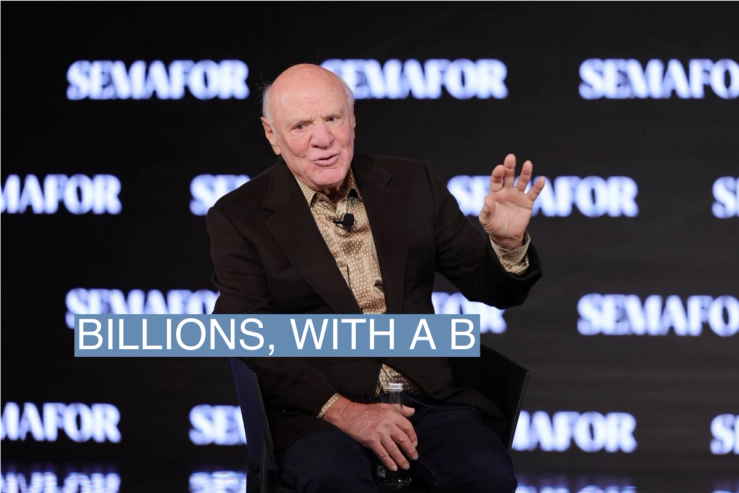The News
Barry Diller fired publishers’ opening shot at artificial intelligence platforms in a Semafor interview this April, suggesting they sue the companies that have trained models on their data.
Now his company, IAC, and a handful of key publishers are close to formalizing a coalition that could lead a lawsuit as well as press for legislative action, people at those companies said. The group crucially includes the two industry pillars, The New York Times and News Corp., as well as Axel Springer.
“The thing that everyone wants to talk about is whether AI is going take over the world to eliminate humans and all that stuff,” IAC CEO Joey Levin, who is playing a central role in the coalition but declined to discuss it in detail, said in an interview in his office on Manhattan’s West Side. An AI takeover of the media “could be more profound than that sort of sci-fi fear.”
Many publishers have begun to experiment with AI tools aimed at making writing more efficient. But executives also worry about threats to everything from their revenue to the very nature of online authority.
The most immediate threat they see is a possible shift at Google from sending traffic to web pages to simply answering users’ questions with a chatbot. That nightmare scenario, for Levin, would turn a Food & Wine review into a simple text recommendation of a bottle of Malbec, without attribution.
“The machine doesn’t drink any wine or swirl any wine or smell any wine,” Levin said.
“Search was designed to find the best of the internet,” he said. “These large language models, or generative AI, are designed to steal the best of the internet.”
In this article:
Ben’s view
Neither publishers nor platform executives are eager to restart the bitter coastal wars of the last decade. And they’re bringing none of the utopianism of the early internet. Publishers are determined not to repeat what many see as the mistakes of the social media era, in which they gave away their content for free. And tech executives are eager to avoid new allegations that they’re destroying democracy and journalism — and the attendant congressional hearings.
And in conversations with leading figures on both sides of the argument, the outlines of a settlement in which AI companies pay for training data are becoming clear — with one large glitch.
Tech companies appear to hope that they can placate publishers with, perhaps, eight figures worth of payouts, as the Facebook News Initiative did when it doled out payments annually between 2019 and 2022, fees reportedly exceeding $20 million for the Times, $15 million for the Washington Post, and $10 million for the Wall Street Journal.
Publishers believe the numbers ought to be much bigger this time around. If these breakthrough language models rely on their inputs, they argue, the share of the value they collect should be commensurate — and should run into the billions of dollars across the industry.
Levin, other publishers and their counterparts at Google, Microsoft, and other tech giants declined to quote numbers, or to discuss the coalition they’re forming.
But the publishers, led by Diller himself, are also threatening to try their luck in court, where complex questions about how copyright law applies to both the inputs to AI training and the outputs of AI models remain largely untested. Publishers are watching with particular interest to a Delaware lawsuit over an artificial intelligence company’s copying of legal texts from Westlaw.
Payments on the scale the publishers expect would mark a dramatic change for companies like Google, which have built high-margin business in large part because they — unlike media companies from Netflix to Comcast — don’t pay for content.
Unless the publishers lower their expectations, or the tech companies adjust their fundamental sense of what it is to be a platform, this high stakes conflict is likely to escalate.
The View From The Platforms
Tech executives raise one major objection to publishers’ demands: They haven’t even figured out a business model for AI yet, and there are no profits to share in the crushingly expensive business of maintaining language models.
A Google spokeswoman, Jenn Crider, said it is “very early days” for large language models.
“As we develop LLM-powered features, we’ll continue to prioritize experiences that send valuable traffic to the news ecosystem. We’re also working to develop a better understanding of the business models for these products and on ways to give web publishers choice and control of their content,” she said in an email.
Notable
- Even as some big publishers attempt to assemble a coalition, others are striking their own deals with platforms, as the Associated Press recently did with OpenAI.
- Google has developed a tool it says will help journalists write articles. Some of the executives who have played with Genesis described it to the New York Times as “unsettling.”
- ChatGPT wrote a novel. Slate says it’s “pretty good.”


